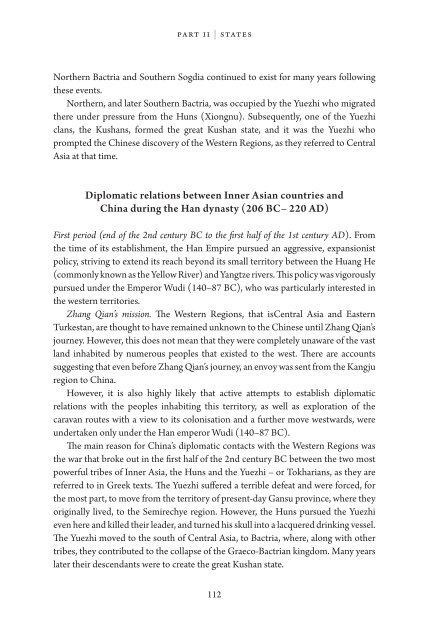You also want an ePaper? Increase the reach of your titles
YUMPU automatically turns print PDFs into web optimized ePapers that Google loves.
part ii | states<br />
Northern Bactria and Southern Sogdia continued to exist for many years following<br />
these events.<br />
Northern, and later Southern Bactria, was occupied by the Yuezhi who migrated<br />
there under pressure from the Huns (Xiongnu). Subsequently, one <strong>of</strong> the Yuezhi<br />
clans, the Kushans, formed the great Kushan state, and it was the Yuezhi who<br />
prompted the Chinese discovery <strong>of</strong> the Western Regions, as they referred to Central<br />
<strong>Asia</strong> at that time.<br />
Diplomatic relations between Inner <strong>Asia</strong>n countries and<br />
China during the Han dynasty (206 BC– 220 AD)<br />
First period (end <strong>of</strong> the 2nd century BC to the first half <strong>of</strong> the 1st century AD). From<br />
the time <strong>of</strong> its establishment, the Han Empire pursued an aggressive, expansionist<br />
policy, striving to extend its reach beyond its small territory between the Huang He<br />
(commonly known as the Yellow River) and Yangtze rivers. This policy was vigorously<br />
pursued under the Emperor Wudi (140–87 BC), who was particularly interested in<br />
the western territories.<br />
Zhang Qian’s mission. The Western Regions, that isCentral <strong>Asia</strong> and Eastern<br />
Turkestan, are thought to have remained unknown to the Chinese until Zhang Qian’s<br />
journey. However, this does not mean that they were completely unaware <strong>of</strong> the vast<br />
land inhabited by numerous peoples that existed to the west. There are accounts<br />
suggesting that even before Zhang Qian’s journey, an envoy was sent from the Kangju<br />
region to China.<br />
However, it is also highly likely that active attempts to establish diplomatic<br />
relations with the peoples inhabiting this territory, as well as exploration <strong>of</strong> the<br />
caravan routes with a view to its colonisation and a further move westwards, were<br />
undertaken only under the Han emperor Wudi (140–87 BC).<br />
The main reason for China’s diplomatic contacts with the Western Regions was<br />
the war that broke out in the first half <strong>of</strong> the 2nd century BC between the two most<br />
powerful tribes <strong>of</strong> Inner <strong>Asia</strong>, the Huns and the Yuezhi – or Tokharians, as they are<br />
referred to in Greek texts. The Yuezhi suffered a terrible defeat and were forced, for<br />
the most part, to move from the territory <strong>of</strong> present-day Gansu province, where they<br />
originally lived, to the Semirechye region. However, the Huns pursued the Yuezhi<br />
even here and killed their leader, and turned his skull into a lacquered drinking vessel.<br />
The Yuezhi moved to the south <strong>of</strong> Central <strong>Asia</strong>, to Bactria, where, along with other<br />
tribes, they contributed to the collapse <strong>of</strong> the Graeco-Bactrian kingdom. Many years<br />
later their descendants were to create the great Kushan state.<br />
112


